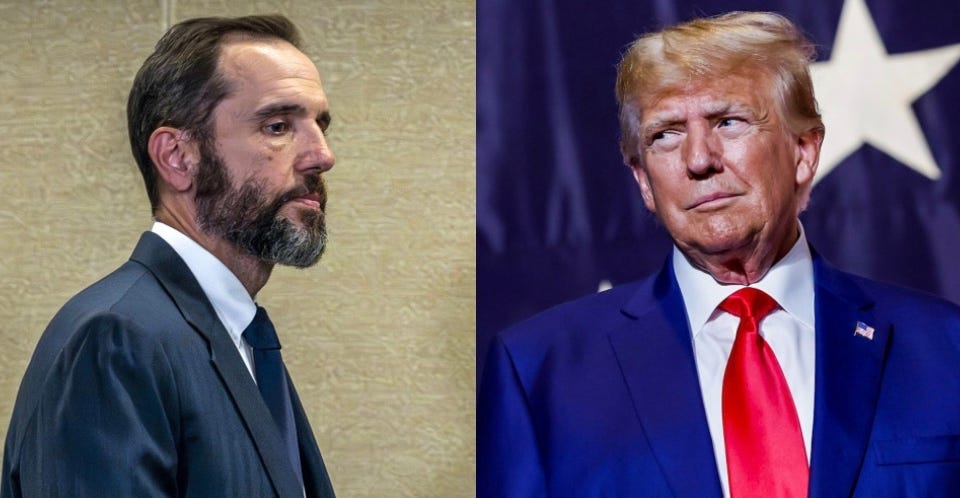Sixties Fan
Diamond Member
- Mar 6, 2017
- 53,755
- 10,437
- 2,140
- Thread starter
- #161
Part 3
Loyalty Über Alles
IN LATE MAY, TWO WEEKS AFTER House Republicans sacked Cheney, Graham made it clear that all values or ideas under discussion within the party would be subordinated to Trump.
The Reagan Foundation and Institute was launching a speaker series titled “A Time For Choosing.” Republican leaders had been invited to answer the question “What should the Republican Party stand for?”
Graham rejected the question as asked-and-answered. “The Republicans have already chosen,” he declared. “If the primary were held tomorrow, President Trump would win . . . going away.” The more important question, Graham countered, was about personal loyalty, not ideas. “Would you support President Trump if he’s our nominee? Every Republican needs to be asked that question,” he said.
Meanwhile, Graham peddled a new conspiracy theory about the 2020 election. He claimed that a “‘Deep State’ science department” had “played a prominent role in the defeat of President Trump” by suppressing evidence that a Chinese lab leak had caused the COVID-19 pandemic.
It was a lot like the corrupt Russia investigation, Graham suggested. “They shut down an inquiry that I think could have changed the election,” he told Brian Kilmeade. If Graham couldn’t prove that Trump had been cheated after ballots were cast, he would argue that Trump had been cheated indirectly, before people voted.
On June 18, Graham spoke in Florida at a conference of the Faith & Freedom Coalition. He proudly asserted that on his first visit to Trump in the White House, he had told the president, “I think God has put you here.” Graham also told the crowd that there had been “a lot of shenanigans” in the 2020 election. A month later, on Fox News, he repeated that Trump “owns the Republican party. . . . This is the party of Donald Trump. If you think otherwise, you’re in for a rude awakening.”
By the fall of 2021, Graham was ready to go after McConnell. Trump was angry at McConnell for cooperating with Democrats on raising the national debt ceiling. Graham entered the fight on Trump’s side and advised McConnell that he had better appease Trump, or else. “If you’re going to lead this party in the House [or] the Senate, you have to have a working relationship with Donald Trump,” said Graham. He made it clear that if McConnell failed to satisfy Trump, Graham would vote to oust McConnell as the party’s Senate leader.
This threat made a mockery of Graham’s original rationale for supporting Trump. In 2015 and 2016, he had tried to keep Trump out of power. Only after Trump won the 2016 election had Graham fully submitted to him. At that time, Graham reasoned that he should serve the new president for two reasons: because Trump had a mandate from the people and because Trump held the nation’s most powerful office.
Now Trump had lost his mandate and his office. McConnell, conversely, had been overwhelmingly re-elected to the Senate and to his post as Republican leader. If Graham truly revered democracy, he would expect Trump to make peace with McConnell.
Instead, Graham demanded that McConnell make peace with Trump. Now that the principle of respecting democracy no longer justified submission to Trump, Graham discarded the principle. He didn’t revere the will of the people. He revered the will of Trump.
Graham told his Republican colleagues that by staying in Trump’s orbit, he was tempering the former president’s behavior. He told the same story to reporters who asked about his friendship with Trump. But Trump showed no signs of being tempered. Instead of backing away from his attacks on the rule of law, he became more aggressive.
On January 29, 2022, at a rally in Texas, Trump offered to pardon people convicted of crimes on January 6th. “If I run and if I win, we will treat those people from January 6th fairly,” he said. “And if it requires pardons, we will give them pardons, because they are being treated so unfairly.”
The next day, Trump defended his attempt to have Pence, in Trump’s words, “change the Presidential Election results.” In a written statement, Trump said the vice president had the right to do this unilaterally. Trump condemned a bill that would “take that right away,” and he lamented that Pence “didn’t exercise that power, he could have overturned the Election!”
When Graham was asked about Trump’s preemptive offer of pardons, he called it “inappropriate.” But he still didn’t blame Trump for inciting the people whose crimes the former president was openly defending.
A week after Trump’s comments about pardons and overturning the election, the Republican National Committee adopted a resolution of censure. It wasn’t a censure of Trump. It was a censure of Cheney and another House Republican, Adam Kinzinger, for working with Democrats on a committee to investigate January 6th. The resolution declared that the RNC would “immediately cease any and all support” of Cheney and Kinzinger.
The RNC agreed with Trump that people who were under investigation for their roles on January 6th, or in various plots to overturn the election, were the true victims. They were “ordinary citizens engaged in legitimate political discourse,” according to the resolution.
McConnell spoke out against the resolution, but Graham defended it. Graham said the RNC was standing up, rightly, for “the people who went to the rally.” He agreed that they were just “exercising their constitutional rights.”
During the summer of 2022, a series of hearings held by the House January 6th Committee exposed Trump’s conspiracies to overturn the 2020 election. He had tried to coerce the Justice Department to declare the election corrupt. He had pressured state officials to “find”—Trump had used that exact word—enough votes to overturn the results. He had told his militant supporters to march on the Capitol, knowing that many of them were armed. Then, for hours, he had watched the attack on TV, rebuffing entreaties to tell the mob to go home.
None of this moved Graham. On June 9, as the hearings opened, he said the committee was just “trying to blame President Trump” and “change the outcome of the midterms.” There was no good reason to air the evidence, Graham suggested, since January 6th was “something every American’s made up their mind about.”
Weeks later, after dozens of witnesses had testified about Trump’s crimes, Graham dismissed the committee as a “sham, one-sided Star Chamber tribunal.” Nearly all the witnesses were Republicans, but Graham pretended that the hearings were a partisan hit job. “This investigation would make the Soviet Union cringe,” he scoffed. “Everybody on the committee has one goal: They want to get Trump.”
On June 17—a day after witnesses described Trump’s persistent attempts to coerce Pence to overturn the election—Graham spoke in Nashville at another conference of the Faith & Freedom Coalition. “You know what I liked about Trump? Everybody was afraid of him, including me,” Graham told the crowd. “Don’t you miss that? Don’t you miss an America that people respected and were a little bit afraid of?”
Three hours later, Trump showed up to tell the Nashville audience what he would do if he regained power. “January 6th defendants are having their lives totally destroyed,” he said. “If I become president someday—if I decide to do it—I will be looking at them very, very seriously for pardons.”
Republicans didn’t have to put up with this. There were many other politicians the party could nominate for president instead of Trump. The most obvious was Florida Gov. Ron DeSantis. But Graham—who had said in 2016 that the nominee should be anyone but Trump—now insisted that only Trump would do. “This is Trump’s party,” said Graham. “I like Ron DeSantis, but I know what I’m getting with Trump: the good, and the bad, and everything in between.”

 specialto.thebulwark.com
specialto.thebulwark.com
Loyalty Über Alles
IN LATE MAY, TWO WEEKS AFTER House Republicans sacked Cheney, Graham made it clear that all values or ideas under discussion within the party would be subordinated to Trump.The Reagan Foundation and Institute was launching a speaker series titled “A Time For Choosing.” Republican leaders had been invited to answer the question “What should the Republican Party stand for?”
Graham rejected the question as asked-and-answered. “The Republicans have already chosen,” he declared. “If the primary were held tomorrow, President Trump would win . . . going away.” The more important question, Graham countered, was about personal loyalty, not ideas. “Would you support President Trump if he’s our nominee? Every Republican needs to be asked that question,” he said.
Meanwhile, Graham peddled a new conspiracy theory about the 2020 election. He claimed that a “‘Deep State’ science department” had “played a prominent role in the defeat of President Trump” by suppressing evidence that a Chinese lab leak had caused the COVID-19 pandemic.
It was a lot like the corrupt Russia investigation, Graham suggested. “They shut down an inquiry that I think could have changed the election,” he told Brian Kilmeade. If Graham couldn’t prove that Trump had been cheated after ballots were cast, he would argue that Trump had been cheated indirectly, before people voted.
On June 18, Graham spoke in Florida at a conference of the Faith & Freedom Coalition. He proudly asserted that on his first visit to Trump in the White House, he had told the president, “I think God has put you here.” Graham also told the crowd that there had been “a lot of shenanigans” in the 2020 election. A month later, on Fox News, he repeated that Trump “owns the Republican party. . . . This is the party of Donald Trump. If you think otherwise, you’re in for a rude awakening.”
By the fall of 2021, Graham was ready to go after McConnell. Trump was angry at McConnell for cooperating with Democrats on raising the national debt ceiling. Graham entered the fight on Trump’s side and advised McConnell that he had better appease Trump, or else. “If you’re going to lead this party in the House [or] the Senate, you have to have a working relationship with Donald Trump,” said Graham. He made it clear that if McConnell failed to satisfy Trump, Graham would vote to oust McConnell as the party’s Senate leader.
This threat made a mockery of Graham’s original rationale for supporting Trump. In 2015 and 2016, he had tried to keep Trump out of power. Only after Trump won the 2016 election had Graham fully submitted to him. At that time, Graham reasoned that he should serve the new president for two reasons: because Trump had a mandate from the people and because Trump held the nation’s most powerful office.
Now Trump had lost his mandate and his office. McConnell, conversely, had been overwhelmingly re-elected to the Senate and to his post as Republican leader. If Graham truly revered democracy, he would expect Trump to make peace with McConnell.
Instead, Graham demanded that McConnell make peace with Trump. Now that the principle of respecting democracy no longer justified submission to Trump, Graham discarded the principle. He didn’t revere the will of the people. He revered the will of Trump.
Graham told his Republican colleagues that by staying in Trump’s orbit, he was tempering the former president’s behavior. He told the same story to reporters who asked about his friendship with Trump. But Trump showed no signs of being tempered. Instead of backing away from his attacks on the rule of law, he became more aggressive.
On January 29, 2022, at a rally in Texas, Trump offered to pardon people convicted of crimes on January 6th. “If I run and if I win, we will treat those people from January 6th fairly,” he said. “And if it requires pardons, we will give them pardons, because they are being treated so unfairly.”
The next day, Trump defended his attempt to have Pence, in Trump’s words, “change the Presidential Election results.” In a written statement, Trump said the vice president had the right to do this unilaterally. Trump condemned a bill that would “take that right away,” and he lamented that Pence “didn’t exercise that power, he could have overturned the Election!”
When Graham was asked about Trump’s preemptive offer of pardons, he called it “inappropriate.” But he still didn’t blame Trump for inciting the people whose crimes the former president was openly defending.
A week after Trump’s comments about pardons and overturning the election, the Republican National Committee adopted a resolution of censure. It wasn’t a censure of Trump. It was a censure of Cheney and another House Republican, Adam Kinzinger, for working with Democrats on a committee to investigate January 6th. The resolution declared that the RNC would “immediately cease any and all support” of Cheney and Kinzinger.
The RNC agreed with Trump that people who were under investigation for their roles on January 6th, or in various plots to overturn the election, were the true victims. They were “ordinary citizens engaged in legitimate political discourse,” according to the resolution.
McConnell spoke out against the resolution, but Graham defended it. Graham said the RNC was standing up, rightly, for “the people who went to the rally.” He agreed that they were just “exercising their constitutional rights.”
During the summer of 2022, a series of hearings held by the House January 6th Committee exposed Trump’s conspiracies to overturn the 2020 election. He had tried to coerce the Justice Department to declare the election corrupt. He had pressured state officials to “find”—Trump had used that exact word—enough votes to overturn the results. He had told his militant supporters to march on the Capitol, knowing that many of them were armed. Then, for hours, he had watched the attack on TV, rebuffing entreaties to tell the mob to go home.
None of this moved Graham. On June 9, as the hearings opened, he said the committee was just “trying to blame President Trump” and “change the outcome of the midterms.” There was no good reason to air the evidence, Graham suggested, since January 6th was “something every American’s made up their mind about.”
Weeks later, after dozens of witnesses had testified about Trump’s crimes, Graham dismissed the committee as a “sham, one-sided Star Chamber tribunal.” Nearly all the witnesses were Republicans, but Graham pretended that the hearings were a partisan hit job. “This investigation would make the Soviet Union cringe,” he scoffed. “Everybody on the committee has one goal: They want to get Trump.”
On June 17—a day after witnesses described Trump’s persistent attempts to coerce Pence to overturn the election—Graham spoke in Nashville at another conference of the Faith & Freedom Coalition. “You know what I liked about Trump? Everybody was afraid of him, including me,” Graham told the crowd. “Don’t you miss that? Don’t you miss an America that people respected and were a little bit afraid of?”
Three hours later, Trump showed up to tell the Nashville audience what he would do if he regained power. “January 6th defendants are having their lives totally destroyed,” he said. “If I become president someday—if I decide to do it—I will be looking at them very, very seriously for pardons.”
Republicans didn’t have to put up with this. There were many other politicians the party could nominate for president instead of Trump. The most obvious was Florida Gov. Ron DeSantis. But Graham—who had said in 2016 that the nominee should be anyone but Trump—now insisted that only Trump would do. “This is Trump’s party,” said Graham. “I like Ron DeSantis, but I know what I’m getting with Trump: the good, and the bad, and everything in between.”

The Corruption of Lindsey Graham - Return of the Orange God-King
TRUMP’S DECLARATION OF WAR on RINOs—Republicans in name only—set the stage for the next two years. He could no longer control the party through presidential power. But he still had a weapon: fear.







 Lucid
Lucid


